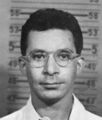Template:Selected anniversaries/May 21: Difference between revisions
No edit summary |
No edit summary |
||
| Line 64: | Line 64: | ||
||1965 – Geoffrey de Havilland, English pilot and engineer, designed the de Havilland Mosquito (b. 1882) | ||1965 – Geoffrey de Havilland, English pilot and engineer, designed the de Havilland Mosquito (b. 1882) | ||
||Johannes Peter Letzmann (d. 21 May 1971) was an Estonian meteorologist, and a pioneering tornado researcher. His prolific output related to severe storms concepts included: developing tornado damage studies, atmospheric vortices, theoretical studies and laboratory simulations, tornado case studies, and observation programs. It generated extensive analysis techniques and insights on tornadoes at a time when there was still very little research on the subject in the United States. Pic. | |||
|link=|1972 – Michelangelo's Pietà in St. Peter's Basilica in Rome is damaged by a vandal, the mentally disturbed Hungarian geologist Laszlo Toth. | |link=|1972 – Michelangelo's Pietà in St. Peter's Basilica in Rome is damaged by a vandal, the mentally disturbed Hungarian geologist Laszlo Toth. | ||
Revision as of 17:03, 7 February 2018
1471: Painter, engraver, and mathematician Albrecht Dürer born. He will introduction of classical motifs into Northern art through his knowledge of Italian artists and German humanists.
1670: Astronomer and physicist Niccolò Zucchi dies. He published works on astronomy, optics, mechanics, and magnetism.
1923: Mathematician and academic Armand Borel born. He will work in algebraic topology, and in the theory of Lie groups. He will contribute to the creation of the contemporary theory of linear algebraic groups.
1932: Bad weather forces aviator Amelia Earhart to land in a pasture in Derry, Northern Ireland, after flying solo across the Atlantic Ocean.
1946: Physicist Louis Slotin is fatally irradiated in a criticality incident during an experiment with the demon core at Los Alamos National Laboratory.
1953: Logician and mathematician Ernst Friedrich Ferdinand Zermelo dies. His work had major implications for the foundations of mathematics; he is known for his role in developing Zermelo–Fraenkel axiomatic set theory, and for his proof of the well-ordering theorem.





